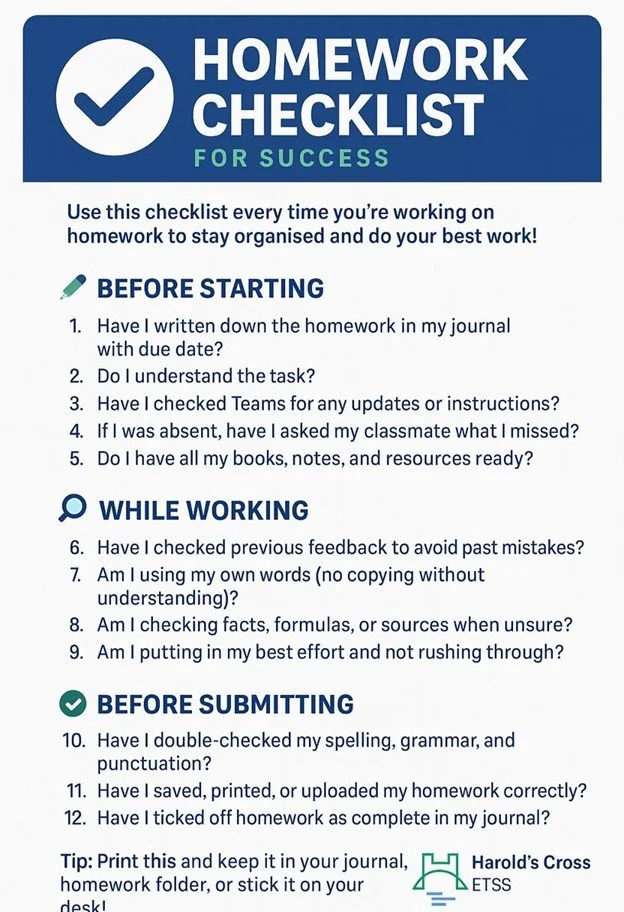Homework
Homework has been found to have a valuable impact on student learning outcomes. This is most likely to be the case when there is a definite purpose regarding student learning, underpinned by clear instructions. By linking homework directly to what has been done in class, learners can practise skills, deepen their understanding, and learn how to review content that will be useful in an examination setting. Similarly, it is hoped that students will learn the benefits of perseverance and hard work so that they are able to ‘stick with’ tasks as the tasks become more challenging.
Therefore, we assert that:
1. Homework should be ‘doable’ and relatively ‘low stakes.’ This means that most learners should be able to approach the work set, confident that they can finish it on their own.
2. Learners need feedback to improve the standard of their work. This feedback can be given in a variety of ways, for example, in a written or formative comment, orally where the learner is asked to write down the feedback, in peer-to-peer assessment where learners are told the rubric for assessing and where they identify features of quality.
3. Although, homework may be given to ‘pre-teach’ or engage students in an initial activity, homework is not used to cover large sections of content or curriculum.
4. Sanctioning students for not doing homework by giving them more work to do is unlikely to have a positive outcome.
Homework Guidelines
The classroom teacher will assign homework including due date during class time. They will communicate the task to students in oral and written form (via Teams Subject Specific Home Channel) and allow reasonable time for students to record their homework in their journal.
Teachers will provide appropriate scaffolding of the homework and provide guidelines on the successful completion of the homework.
Homework is scaffolded, differentiated to challenge gifted and talented and support students with additional needs, and linked to class learning.
Homework should be meaningful and worthwhile, relating to the topic(s) covered in class to reinforce the learning.
Homework should be included in lesson planning including time for feedback.
Students must record all homework in their journal including due date and tick when complete.
Students should refer to the Homework Checklist for Success in their journal (see page 5 of these guidelines)
Journals are the property of the school and will be checked regularly by tutors and subject teachers and should be kept neat.
Teachers will post all homework on the relevant subject’s homework channel on Teams.
Homework should be completed on time and to the best of the student’s ability
All work completed at home must be authentic and reflect the student’s own ability.
Students are not permitted to use any forms of AI to complete their work or assignments unless specifically instructed to do so by a teacher.
It is the parents/guardian's responsibility to inform the relevant subject teacher of any reasons why a student was unable to complete a homework assignment. A parent/guardian should communicate this via Tyro.
Parents/guardians are encouraged to check journals and teams' homework channel, and communicate any issues via tyro app.
Subject teachers will check homework and speak to the student directly if homework is not complete. The following sanctions will apply every half term:
1st time – warning & recorded on Tyro “homework warning first time”
2nd time – negative point on Tyro (homework not complete) & communicate to the student
3rd time – detention & contact home
Ongoing – follow Ladder of Referral
If a student is absent due to extra-curricular activities, it is their responsibility to check Teams or check with a classmate what they missed.
Repeated failure to complete assigned homework due to involvement in extracurricular activities may result in some of these privileges being revoked for a particular period. In the event of such a repeated failure, subject teacher to discuss this with relevant Year Coordinator.
Feedback for Students
Teachers will check and correct all homework and provide appropriate and effective feedback to promote learning. These are in line with Assessment for Learning.
Please see below following expectations around corrections and feedback:
Teacher written or typed correction – once every three weeks / twice every six weeks (half-term) (sign and date copybooks/notebooks)
Class correction
Class discussion
Peer-assessment
Self-assessment under the direction of the teacher
Formative feedback using WWW (What Went Well) and EBI (Even Better If)
Teachers should maintain records of this feedback.
Check on journal and homework assignments regularly until students develop good independent skills.
Encourage students to complete work to the best of their ability.
Encourage students to communicate difficulties with teachers.
Check the journal for notes from teachers regarding homework and initial these as a way of acknowledging them.
Support students and teachers in working towards a common goal.

